Rob Bignell's Blog, page 278
November 27, 2015
How to promote your book presentation
A book signing,  reading or other presentation centered on your book obviously is a good way to promote your title. To be successful, however, your presentation will need to be promoted as well.
reading or other presentation centered on your book obviously is a good way to promote your title. To be successful, however, your presentation will need to be promoted as well.
Some forms of promotion work far better than others. It mainly depends on where you are presenting the book.
If appearing at a bookstore, retailer or library, a press release to local newspapers, radio, TV stations, and bloggers who cover events in that area works best. Local media usually are eager to print releases (or to include them in calendars) for events in their area. Less effective is social media in which you contact your friends/followers, as they likely are scattered around the country. Instead, you want to get on your event promoted on your host���s Twitter, Facebook and other sites.
When appearing at conferences or workshops, a press release to local media largely will go ignored. Instead, focus on bloggers who write about the field your will present in, especially if those bloggers cover the organization hosting the conference or workshop. The most effective way to promote your presentation will be through that organization���s social media, since its members are the ones who will attend the conference/workshop.
Of course, mentioning on your blog and other social media sites that you are making a presentation doesn���t hurt. Just don���t expect your attendance to pick up much, if at all (The exception would be Facebook in which the majority of your friends live in the community where the event is held.). The real benefit of such social media exposure is that you give the appearance to anyone reading the tweet or post of being more than just an author. Instead, you are an author in demand, and that can raise the respect level for you as you seek new friends/followers. It even can bring in new business if your book relates to your occupation.
One thing NEVER to do is to pay for advertisement. You simply will not recoup the costs of an ad in a newspaper or on a radio station through book sales unless you the biggest of names in writing. In such a case, the host of your event will pay for advertising because your name will draw people to their store or institution.
Professional Book Editor: Having your novel, short story or nonfiction manuscript proofread or edited before submitting it can prove invaluable. In an economic climate where you face heavy competition, your writing needs a second eye to give you the edge. Whether you come from a big city like Pittsburgh, Pennsylvania, or a small town like Cluttsville, Alabama, I can provide that second eye.
<A HREF="http://ws-na.amazon-adsystem.com/widg... Widgets</A>Related articles
 Writing Prompt: Start with last line
Writing Prompt: Start with last line Writing Prompt: Thought-provoking question
Writing Prompt: Thought-provoking question How to select a great Twitter profile picture
How to select a great Twitter profile picture What is a 'platform' when promoting a book?
What is a 'platform' when promoting a book?
November 26, 2015
Writing Inspiration: Make yourself accountable
Making 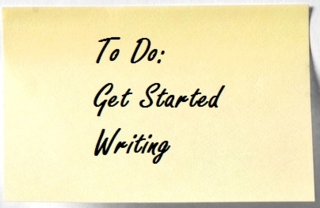 yourself accountable to another also is a good way of motivating yourself to achieve a goal. So tell you family you���re writing a book. Tell them it will come out next Thanksgiving. Are you feeling a little pressure? Good. Now go impress your family so you can show off copies of your book to them before everyone sits down to turkey, mashed potatoes and cranberries 365 days from now.
yourself accountable to another also is a good way of motivating yourself to achieve a goal. So tell you family you���re writing a book. Tell them it will come out next Thanksgiving. Are you feeling a little pressure? Good. Now go impress your family so you can show off copies of your book to them before everyone sits down to turkey, mashed potatoes and cranberries 365 days from now.
Professional Book Editor: Having your novel, short story or nonfiction manuscript proofread or edited before submitting it can prove invaluable. In an economic climate where you face heavy competition, your writing needs a second eye to give you the edge. Whether you come from a big city like Youngstown, Ohio, or a small town like Hogshooter, Oklahoma, I can provide that second eye.
<A HREF="http://ws-na.amazon-adsystem.com/widg... Widgets</A>Related articles
 Writing Inspiration: Finding Time to Write, Part III
Writing Inspiration: Finding Time to Write, Part III Self-publishing tip: Revise by deconstructing
Self-publishing tip: Revise by deconstructing Boost book sales via backlinks to your website
Boost book sales via backlinks to your website
November 25, 2015
Editing client publishes first heroic fantasy novel
A recent 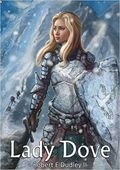 editing client of mine has published his first heroic fantasy novel. Robert E. Dudley II���s ���Lady Dove: Jubilant Order of the Air��� follows the story of the great Lady Dove, a legendary leader and unstoppable warrior. Yet as the Commander of the Jubilant Order of the Air, an epic fighting order, she is a failure.
editing client of mine has published his first heroic fantasy novel. Robert E. Dudley II���s ���Lady Dove: Jubilant Order of the Air��� follows the story of the great Lady Dove, a legendary leader and unstoppable warrior. Yet as the Commander of the Jubilant Order of the Air, an epic fighting order, she is a failure.
Two of her members were taken by a Demon Lord from the Pits while she was in command. Twenty times her order descended into the fiery abyss to reclaim their fallen comrades. Each time was a failure. Now the Jubilant Order is no more, its members scattered to the far corners. Only Lady Dove remains.
Finding a powerful sage who augurs that her only hope to recover her fallen brothers is to align herself with Krayer, a fallen Paladin who leads an order of evil warriors, the Knights of the Bloody Rose. Lady Dove will stop at nothing to reclaim her lost members and reform her order ��� not even teeming up with the foul Lord of Death.
The book is available online.
Professional Book Editor: Having your novel, short story or nonfiction manuscript proofread or edited before submitting it can prove invaluable. In an economic climate where you face heavy competition, your writing needs a second eye to give you the edge. Whether you come from a big city like Tucson, Arizona, or a small town like Zap, North Dakota, I can provide that second eye.
<A HREF="http://ws-na.amazon-adsystem.com/widg... Widgets</A>Related articles
 Avoid placing 'used furniture' in your story
Avoid placing 'used furniture' in your story A change in the text: Amend vs. emend
A change in the text: Amend vs. emend Editing client publishes first fantasy novel
Editing client publishes first fantasy novel
November 24, 2015
Writing Prompt: Outline a story idea
Suffering 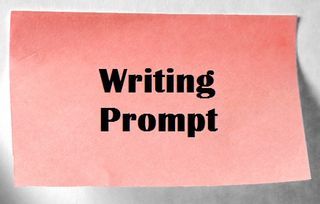 from writer���s block or need to add some spunk to your writing? The problem may be that you need to change up your routine.
from writer���s block or need to add some spunk to your writing? The problem may be that you need to change up your routine.
To that end, try this tip: Outline a story idea in your project bible or journal. Do you prefer to use note cards? Beat-by-beat list? Flow chart? Did the method work well for you? Select another kernel of a story idea and try a different method of outlining it. Which of the two methods do you prefer?
Professional Book Editor: Having your novel, short story or nonfiction manuscript proofread or edited before submitting it can prove invaluable. In an economic climate where you face heavy competition, your writing needs a second eye to give you the edge. Whether you come from a big city like Houston, Texas, or a small town like Chicken, Alaska, I can provide that second eye.
<A HREF="http://ws-na.amazon-adsystem.com/widg... Widgets</A>Related articles
 Attract attention by adding 'shout line' to cover
Attract attention by adding 'shout line' to cover Use hashtags to sell your book on Facebook
Use hashtags to sell your book on Facebook No worries: Nerve-racking vs. nerve-wracking
No worries: Nerve-racking vs. nerve-wracking
November 23, 2015
Editing client publishes book on synchronicity
A recent 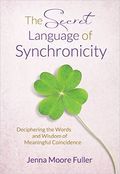 editing client of mine has published her first spiritual self-help book. Jenna Fuller Moore���s ���The Secret Language of Synchronicity: Deciphering the Words & Wisdom of Meaningful Coincidence,��� examines how the Universe answers different people through different types of coincidence.
editing client of mine has published her first spiritual self-help book. Jenna Fuller Moore���s ���The Secret Language of Synchronicity: Deciphering the Words & Wisdom of Meaningful Coincidence,��� examines how the Universe answers different people through different types of coincidence.
Once we discover our unique style, it is easier to understand these personal signs and benefit from their meanings. The book explores the essential link between our intuition and flow, that wonderful stream of ongoing serendipities offered by the Universe. It delves into the how-to ��� attracting, understanding and responding to this higher wisdom, our potential to be transformed when we do, and the best benefit of all ��� how to lead happier, more meaningful lives.
The book is available online.
Professional Book Editor: Having your novel, short story or nonfiction manuscript proofread or edited before submitting it can prove invaluable. In an economic climate where you face heavy competition, your writing needs a second eye to give you the edge. Whether you come from a big city like Las Vegas, Nevada, or a small town like Accident, Maryland, I can provide that second eye.
<A HREF="http://ws-na.amazon-adsystem.com/widg... Widgets</A>Related articles
 Writing Prompt: Pen your autobiography
Writing Prompt: Pen your autobiography Writing inspiration: Don't fret about poor writing
Writing inspiration: Don't fret about poor writing Long-time editing client's novelette published
Long-time editing client's novelette published
November 22, 2015
Five Great Quotations for Aspiring Writers
���If you 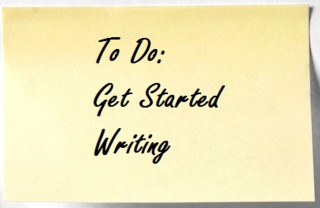 want to be a writer, you must do two things above all others: read a lot and write a lot. There's no way around these two things that I���m aware of, no shortcut.��� - Stephen King
want to be a writer, you must do two things above all others: read a lot and write a lot. There's no way around these two things that I���m aware of, no shortcut.��� - Stephen King
���I meet far too many people who are going to be writers ���someday.������ ��� Robin Hobb
���A professional writer is an amateur who didn���t quit.��� - Richard Bach
���The darkness has ink eyes, and if you stare long enough, you���re going to see it blink black. That���s the moment to start writing.��� - Jarod Kintz
���You will have the grace of writing, when you boldly begin to write your first sentences.��� - Lailah Gifty Akita
Professional Book Editor: Having your novel, short story or nonfiction manuscript proofread or edited before submitting it can prove invaluable. In an economic climate where you face heavy competition, your writing needs a second eye to give you the edge. Whether you come from a big city like Kansas City, Missouri, or a small town like Truth or Consequences, New Mexico, I can provide that second eye.
&amp;amp;lt;A HREF="http://ws-na.amazon-adsystem.com/widg... Widgets&amp;amp;lt;/A&amp;amp;gt;Related articles
 Five Great Quotations for Aspiring Writers
Five Great Quotations for Aspiring Writers How to format drop caps into your ebook
How to format drop caps into your ebook Five Great Quotations about Story Ideas
Five Great Quotations about Story Ideas
November 21, 2015
Writing Inspiration: Focus on the present
Focus on 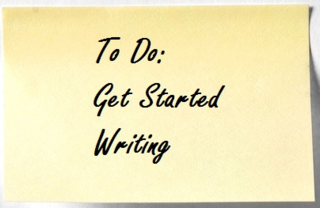 the present by taking note of what you do as writing. Note the feel of the pencil in your hand or hear the taps of the keys as you type. Concentrate on the words you add, as if hearing them spoken aloud. Zone out everything around you.
the present by taking note of what you do as writing. Note the feel of the pencil in your hand or hear the taps of the keys as you type. Concentrate on the words you add, as if hearing them spoken aloud. Zone out everything around you.
Professional Book Editor: Having your novel, short story or nonfiction manuscript proofread or edited before submitting it can prove invaluable. In an economic climate where you face heavy competition, your writing needs a second eye to give you the edge. Whether you come from a big city like Birmingham, Alabama, or a small town like Buttzville, New Jersey, I can provide that second eye.
<A HREF="http://ws-na.amazon-adsystem.com/widg... Widgets</A>Related articles
 Why you can't get your outline into words
Why you can't get your outline into words I refuse to give up on my writing because I haven't explored every possible way to revise it.
I refuse to give up on my writing because I haven't explored every possible way to revise it. Five Great Quotations about Readers
Five Great Quotations about Readers
November 20, 2015
Potential locations for book presentations
Once you���ve  decided that a public presentation is a good way to promote your book, you���ll need to find some spots to hold your event. Identifying those locales can help you determine what kind of presentation (book signing, topical presentation, etc.) you���ll make and place you on the path for contacting the right people to set up such an event.
decided that a public presentation is a good way to promote your book, you���ll need to find some spots to hold your event. Identifying those locales can help you determine what kind of presentation (book signing, topical presentation, etc.) you���ll make and place you on the path for contacting the right people to set up such an event.
Among the many locations you might deliver a presentation with the aim of selling your book include:
��� Bookstores ��� Though the obvious choice for holding a book-related event, it may not be the best location. Don���t waste time appearing at bookstores that lack a connection to your book; only hold events at stores in which you either are a local author or your book somehow has a connection to the region the store is located. Locally-owned bookstores will be more receptive to your self-published book than chains.
��� Retailers/institutions related to your book���s topic ��� Always think about what stores and spots (other than bookstores and libraries) where you might purchase books similar to the one you���ve written. For example, if you���ve written a travel guide to an area, then outfitters or the gift shop at the local tourism office might wish to carry your book and hence host an event.
��� Conferences/conventions related to your book���s topic ��� Such events usually offer breakout sessions, workshops, or booths in which you can appear. The book sale generally comes after your presentation has impressed upon your audience that you are interesting and know your stuff.
��� Institutions of learning ��� Libraries and colleges often will host book-related events. Typically a library holds a book reading/signing similar to a bookstore while at a college you���ll have to give to students a presentation much like you would at a conference/convention.
��� Writers festivals ��� Often colleges and regional arts groups host such events for writers and readers. You can set up a table on a ���writers row��� or make a presentation about your writing experience at such festivals.
Professional Book Editor: Having your novel, short story or nonfiction manuscript proofread or edited before submitting it can prove invaluable. In an economic climate where you face heavy competition, your writing needs a second eye to give you the edge. Whether you come from a big city like Denver, Colorado, or a small town like Dewey Beach, Delaware, I can provide that second eye.
<A HREF="http://ws-na.amazon-adsystem.com/widg... Widgets</A>Related articles
 Writing Inspiration: Go off the grid
Writing Inspiration: Go off the grid Self-publishing tip: Give yourself an editor
Self-publishing tip: Give yourself an editor Skip headers, footers, page numbers in ebook
Skip headers, footers, page numbers in ebook
November 19, 2015
Five tips for taking a book cover photo
If self-publishing 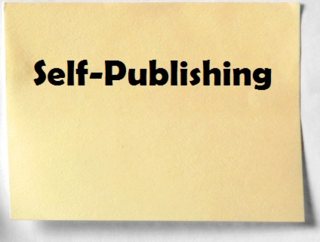 your book, you may need to come up with a photo for your front cover. You can go about this in one of three ways: hire someone to design the cover for you and let that person look for the photo; purchase a photo, usually from an online stock photo provider; or take the photo yourself.
your book, you may need to come up with a photo for your front cover. You can go about this in one of three ways: hire someone to design the cover for you and let that person look for the photo; purchase a photo, usually from an online stock photo provider; or take the photo yourself.
Other than time, the last option ��� take the photo yourself ��� is the least expensive of the three choices. If you���re intrepid enough, it���s worth a try. After all, if your photo shoot fails, you always can go one of the other two routes.
The truth is you���re probably a better photographer than you realize. We live in a very visual society, and with the advent of avatars, selfies, and Instagram, we constantly take photos. Still, there are some basic guidelines that professional photographers follow that you���ll want to consider:
��� Know what you want a picture of before setting out with your camera ��� If your novel is set on a farm, for example, pick a key symbol from your book, such as a barn, that says ���farm.��� Then focus on taking pictures of barns. This will keep you from wasting time.
��� Shoot at the right time of the day ��� If shooting outdoors, aim for the times of 9 a.m. to 11 a.m. and again at dusk. This gives you enough lighting but allows for it be subdued rather than washing out your subject.
��� Keep the sun to your back ��� Unless you���re aiming for glare and sun rays in your photo, the sun behind you on a perpendicular line to the subject you���re shooting eliminates shadows and glare.
��� Frame the photo to match your cover ��� You probably need blank space at the top of your photo for your title. If taking a picture of a barn, the sky works well for that. Likewise, the bottom fifth of the cover might need to largely be one color so that you can place your name there; grass in front of the barn would work well for that.
��� Take lots of photos from different angles ��� A newspaper photographer might take a couple of hundred of photos or more to find just the right one. Move around as well to see what interesting angles you can view the subject from.
Professional Book Editor: Having your novel, short story or nonfiction manuscript proofread or edited before submitting it can prove invaluable. In an economic climate where you face heavy competition, your writing needs a second eye to give you the edge. Whether you come from a big city like Denver, Colorado, or a small town like Dewey Beach, Delaware, I can provide that second eye.
<A HREF="http://ws-na.amazon-adsystem.com/widg... Widgets</A>Related articles
 Frontlist, backlist mean little in self-publishing
Frontlist, backlist mean little in self-publishing Self-publishing tip: Give yourself an editor
Self-publishing tip: Give yourself an editor What is a 'platform' when promoting a book?
What is a 'platform' when promoting a book?
November 18, 2015
Don���t be led to ruin: Wrack vs. rack
Too many 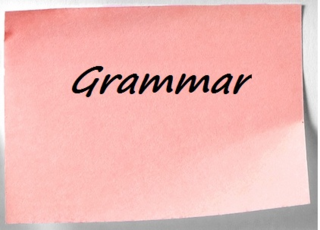 writers suffer at the hands of these two words.
writers suffer at the hands of these two words.
Rack, as a verb, generally means to torture (rack my brains). As a noun, it can mean a variety of things, but the forms most often misspelled are those referring to an instrument of torture (The inquisitor planned to stretch his limbs on the rack.) or to be in a state of deep anguish (racked with sorrow). Rack as a noun also can refer to a frame, this its use as a verb in rack up points or rack billiard balls.
Wreak, as a verb, means to wreck (to wreak havoc). As a noun, it means ruin or destruction (Cleveland has been going to wrack for decades.).
The easy way to remember the difference is rack = torture while wrack, with an extra letter, goes the extra step of actually destroying something.
Professional Book Editor: Having your novel, short story or nonfiction manuscript proofread or edited before submitting it can prove invaluable. In an economic climate where you face heavy competition, your writing needs a second eye to give you the edge. Whether you come from a big city like Sacramento, California, or a small town like Intercourse, Pennsylvania, I can provide that second eye.
&amp;lt;A HREF="http://ws-na.amazon-adsystem.com/widg... Widgets&amp;lt;/A&amp;gt;Related articles
 Writing Inspiration: Finding time to write, Part II
Writing Inspiration: Finding time to write, Part II What is a 'cookie cutter' story?
What is a 'cookie cutter' story? Don't smother writing with your red pen
Don't smother writing with your red pen



